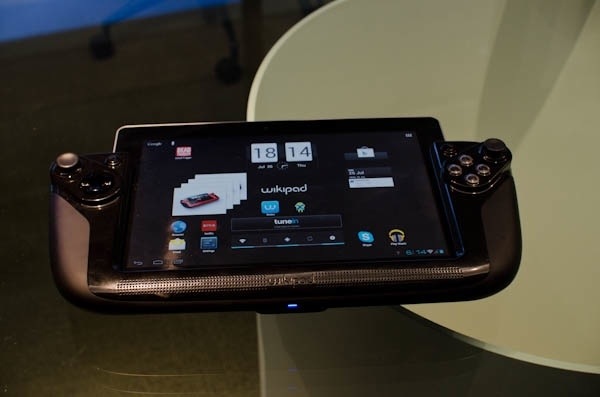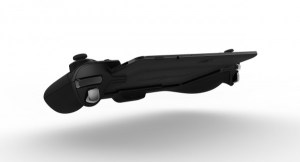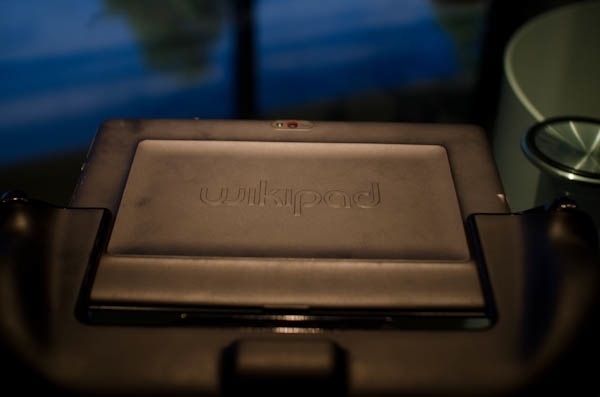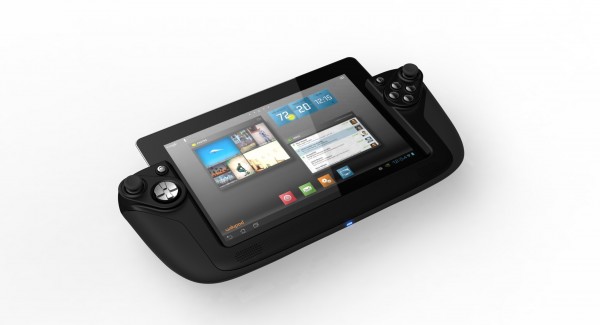
This is part 2 of our interview with Wikipad’s James Bower and Fraser Townley, the company’s CEO and president of sales. Click here to read part 1.
GamesBeat: Getting back to partnerships, are you working with OnLive as well as Gaikai/Sony?
James Bower: We’re in discussions with OnLive as well. One of the key things of Wikipad is that we’re approaching this as a very open platform. We’re willing to work with a lot of various players. The most important thing for us is that our customers have content and that there are various ways for them to get content. There’s the traditional way through Google Market. And then there’s the streaming games, like Gaikai, which was just bought by Sony, and OnLive. We’re in discussions with what our relationship is moving forward.
We also have other forms of content that are interesting, forming on the horizon, that I can’t share yet. We’re not concerned that there won’t be enough content on the Wikipad to get started, and it’ll only get better over time.
GamesBeat: What is Wikipad’s funding? Is the company self-funded?
Bower: The core founders have funded all of the capital to date–
GamesBeat: And the core founders are yourself….
Bower: Myself, Matthew Joynes, and one other founder that we’ll be announcing shortly. We haven’t discussed him as a founder because of who he is, but that will be coming out shortly. It’s a higher-profile person. A lot of the financing of the business is through banking relationships for the purchase orders we have, and things like that.
GameBeat: You previously worked at Master Image. What was your position there?
Bower: President/COO.
GamesBeat: And when was the company acquired?
Bower: Master Image was acquired from Korea and moved to California in November 2009.
GamesBeat: Do you think you’ll have to look for outside funding, perhaps getting closer to the product release?
Bower: I think it’s a question of how fast we want to grow. As of today, they’re fine. So to answer your question, yes, we’re open to look at that and how it can accelerate the business, but it’s not something we’re overly concerned about doing in the short term because of where we’ve come with doing it ourselves.

GamesBeat: Why go with Tegra T30 instead of the more powerful T33, like in the ASUS Transformer Prime Infinity TF700T?
Bower: One of our goals was to ensure that the Wikipad was both lightweight and thin as possible. The T30s is Nvidia’s smallest, high-powered, component CPU. The T33 is a larger component requiring a larger PCB and would have added addition thickness and, in turn, additional weight to the Wikipad. An additional benefit to the T30s is that it draws less power from the battery. This results in the benefit of longer battery life for gamers using the Wikipad compared to the T33, which draws more power from the battery.
GamesBeat: From my own research, it seems like Wikipad is a secretive company. The company has put out so little information. Is this intentional?
Bower: We really had the intent to come out with the stereoscopic version of the Wikipad. And we made the announcements at CES. With some of the decisions we’ve made to make a better tablet, faster platform, that gamers will take very seriously, some of that strategy had to shift a little bit. We’re being very cognizant and careful about what we announce and when we announce it. We don’t want to mismanage the expectations of our future customers. As you’ve seen, there are a lot of people who are excited with what’s coming, with the potential of Wikipad, of what it means. And we want to be very careful and cautious on what we say, and we want to deliver on what we say.
But you’re going to see a shift in the chatter coming from us, and we’re going to amplify things considerably, going into the launch of the company. It’s just us being cautious.
GamesBeat: Are there any game partnerships, like with developers or publishers, that Wikipad has to release titles specific to the Wikipad?
Bower: We’re working with some of the [graphics] engine guys, like Unity and a couple of other guys that build the engines for other guys. We’re in some discussions for unique game designs for the Wikipad, but there’s nothing to the point where we can make an announcement. We’re going to see a lot of content coming from a lot of directions.
GamesBeat: What can you say about the manufacturing of the Wikipad?
Bower: We’re working with the top two manufacturing plants in the world, that have embraced us as a newer company and have taken us on.
GamesBeat: Can you announce who they are?
Bower: Not yet. But we can sleep at night knowing that the guys who sleep at night are the guys who are manufacturing it for us are manufacturing some of the best brand names in the market.

GamesBeat: Several products similar to the Wikipad have been showed over the last year. The Wii U uses a tablet controller but targets a home audience. Razer’s Project Fiona concept device is a laptop-in-a-tablet with a built-in controller running Windows 8. How would you differentiate Wikipad from these?
Bower: It’s challenging to come back with a very poignant answer to that, because one’s a concept and the other people have only just started to see and play with. The unique factor that we have is that we’re really a bridge between a historically mobile console and the invention of the tablet. We do everything as good or better than other tablets on the market, and very easily you can transform the Wikipad into a very efficient, easy-to-use video game device that’s very comfortable.
How we’re different is that we’re not just about gaming. The focus of the company is gaming; that’s who we are, and that’s our pedigree. But when this comes to market, people are going to realize that, wow, I might as well just buy the Wikipad to do all of this plus have fun with games and have a control mechanism that I have on my console.
GamesBeat: Apple holds 68 percent of tablet marketshare with the iPad. Amazon’s Kindle is the next best, and it’s not even close. Android isn’t even close, even though it’s riding smooth at 50 percent of smartphone marketshare. Is that a concern?
Bower: Not really. Apple’s done such a fantastic job with their products, and we all love them. What we’re coming to the market with is a different concept; it’s not just a tablet — it’s a mobile gaming platform that can do all of the functions that you can with a tablet with all of the advantages you have for gaming. So we’re competing right down the middle with what a tablet is, with what people expect out of a tablet, and with what people expect out of a mini console device.
And it’s a space that isn’t populated by very many, or anybody, because we’re really the first ones to market on this. And the other aspect of this is if we’re as successful with this as we believe we’re going to be, from the indications from retailers, from the orders we already have, we don’t have to dominate a market to do really well, because we’re new, we’re relatively small, and we’re innovative, we’re agile. We have a roadmap for the next 24 months. We don’t have to make 2, 3, 10, 20 percent of the market to do really well. One percent of the market is tremendous success. But I think we’re going to do better than that.
 GamesBeat: Do you also see the Wikipad competing with portable game consoles, or does it hit the middle ground so users can have a tablet, a game console, all in one device?
GamesBeat: Do you also see the Wikipad competing with portable game consoles, or does it hit the middle ground so users can have a tablet, a game console, all in one device?
Bower: That’s what I would say. What we’re proposing to the market is a bridge between the two. We’re saying if you get this, you can still do all of the things you love to do with a tablet, and you’re also going to have access to all of the great content that’s historically only been able to get through a console-only device.
GamesBeat: What do you think about newer game technologies like Microsoft’s Smartglass? Or the large number of upcoming Android game controllers? And the recently announced Kickstarter success home Android-based game console Ouya?
Bower: What’s coming from Microsoft is great. We’ve seen some of the prototypes of Windows 8 and RT, and it’s great. The interesting thing about the future of that platform is going to be the access of some PC content. There’s not much I’m going to talk about in relation to our company at this point, as it relates to Microsoft’s platform, but it is something that we’re looking into. It’s something that we’re open to, not to replacing the current platform we have now, but maybe as an additional product. But it’s exciting. I think Microsoft has finally got a hit with this new OS. And behind the scenes, retailers and manufacturers behind the scenes, are really excited.
GamesBeat: And that’s notwithstanding Valve chief Gabe Newell’s recent remarks about how Windows 8 is just awful?
Bower: Everyone’s going to have their own opinion. I think Android has done a fantastic job on getting out there. If you look at the global numbers, Android has outpaced everything. You then talked a little bit about…?
GamesBeat: Android game controllers?
Bower: You know, for me…I can only speak for myself because our product isn’t on the market yet. If you’re dealing with a mobile product, if there’s separation between the screen and the your person, then it’s an unengaged experience. I think in order to have the experience, on a device that is personal, that you’re willing to put your credit card into, the game experience on controllers has to be directly connected because you’re expecting it to be totally personal. I would rather use this [holding an Xbox controller] than this on a tablet that I have to prop up and play. That’s all I can say. The market will determine who’s the winner at the end.
And since I mentioned Ouya, we’re really excited about Ouya. Them talking about and launching on Kickstarter, and the results that they have, is a really interesting and solid sign for us. The games that are going to play on that are going to work on the Wikipad, and the games that will work on Wikipad will work on the Ouya. The more content that is prepared for them is going to help us, and the more content prepared for us is going to help them. It’s a very interesting concept that they have.
What I think it’s really going to come down to is how can these devices, and how can our partners like google and others, begin to fix the piracy issues? Because the big game developers, the Epic’s of the world, the Crytek’s, they won’t invest the tremendous amount of money they spend to create these great games for consoles until the piracy issues are fixed. Because it’s a lot more difficult to pirate something for a Playstation or an Xbox. It’s just a lot more work. And the discussions that we’ve had with them is yes, the concept is great, but fix the piracy so that our investment of $30 million, $40 million, $50 million, $80 million in marketing and development cost isn’t going to go to a waste and everyone is going to steal it. Fix that problem and we’ll develop everything for this platform.
GamesBeat: But you’re not concerned at this point about piracy….
Bower: Not for us. But I think as far as the experience on these devices, the game publishers need to know that their investment in these high-quality products is protected, and then we’ll see more of that content come about. We’re very involved with the dynamics behind the scenes with our partners like Nvidia and Google and others about how we can help…we’re people’s art that they create is protected, and respected, and paid for. So that there’s enough money so they can develop their next games.

GamesBeat: Have you been in contact with Ouya, maybe for a partnership?
Bower: We love what they’re doing, I’m sure we’re going to have a conversation at some point, but there’s nothing in the works right now. There isn’t anything worth talking about, or even speculating about.
GamesBeat: What about, since we already spoke about potentially going outside of the company for funding, using Kickstarter since Ouya was so successful. Is that something that you’re considering?
Bower: Frankly speaking, we’ve considered that from the beginning. We decided not to because of the significant adoption that has been relayed to us from retailers around the world. Would Kickstarter have helped us or hurt us? We want to see the retailers make money with us. Right now we’re really focusing on the retailer relationships that we already have in place.
GamesBeat: When will the Wikipad ship?
Bower: We’re looking to release later this year.
GamesBeat: And that’s just in the U.S.?
Bower: For now, yes. We’re also actively looking at the European and Asian markets.
[vb_gallery id=507606]
VentureBeat's mission is to be a digital town square for technical decision-makers to gain knowledge about transformative enterprise technology and transact. Learn More

